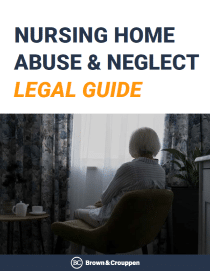In Missouri, the statute of limitations for lawsuits alleging personal injury from nursing home abuse and neglect must be filed within 5 years, starting from the date of the injury (or date it was discovered).
The statute of limitations refers to the legal timeframe within which a person must file a lawsuit. In Missouri, this time frame varies depending on the nature of the claim and the type of damages being sought.

Use our guide to learn how to handle nursing home abuse and neglect, along with key legal considerations and insights.
Exceptions to the Statute of Limitations for Nursing Home Abuse Cases
There are a couple exceptions to Missouri’s statute of limitations:
- Discovery Rule: The “discovery rule” is an important exception that applies when the victim could not have reasonably discovered the harm at the time it occurred. In such cases, the statute of limitations may begin from the date the harm was discovered or when it reasonably should have been discovered.
- Tolling for Mental Incapacity: If the individual who suffered harm is mentally incapacitated, the statute of limitations might be “tolled,” or temporarily suspended, until the individual regains mental capacity.
- Government Entities: If the nursing home is operated by a government entity, different rules and deadlines might apply. It’s important to consult legal experts in such cases.
Additional Missouri Nursing Home Abuse Laws
- Missouri Nursing Home Residents’ Bill of Rights: Nursing home residents in Missouri are protected by a comprehensive set of rights outlined by Missouri’s state laws. These rights encompass areas such as the right to dignity, privacy, informed consent, and the right to be free from abuse and neglect. Violations of these rights can be critical evidence in nursing home cases.
- Negligence and Standard of Care: To establish negligence in a nursing home abuse lawsuit, it’s important to show that the facility or staff breached their duty of care owed to the resident. This breach of duty must have directly caused harm or injury. Establishing negligence often involves demonstrating that the facility failed to meet the industry’s standard of care, like in the case of elderly dehydration and malnutrition.
- Evidentiary Considerations: Gathering evidence in nursing home cases can be challenging due to the vulnerability of residents and the potential difficulty in obtaining their statements. Medical records, surveillance footage, eyewitness accounts, and expert testimony can all play vital roles in building a strong case.
- Comparative Negligence: Missouri operates under a “pure” comparative negligence rule. This means that even if a nursing home resident is partially responsible for their injuries, they can still recover damages. However, their compensation will be reduced in proportion to their degree of fault.
- Medical Malpractice: If the case involves medical malpractice, special laws and regulations apply. Missouri law requires plaintiffs to provide a written opinion from a qualified healthcare provider within 90 days of filing the lawsuit, stating that the case has merit. If your nursing home abuse and neglect claim is the result of medical malpractice, the statute of limitations for medical malpractice gives patients 2 years to file a claim from the date of injury.
- Wrongful Death: If the neglect or abuse in a nursing home results in the death of a resident, the statute of limitations for wrongful death claims is 3 years from the date of the resident’s death.
Brown & Crouppen Nursing Home Settlements
- $748,848 – Nursing home neglect led to multiple bedsores led to severe infection
- $400,000 – Nursing home neglect led to bed sores and sepsis
- $407,046 – Neglect led to choking and brain damage/coma
- $500,000 – Abuse victim had bedsores that led to toxic shock syndrome
- $1,000,000 – Nursing home patient was murdered by her roommate
- $900,000 – Nursing home patient suffered from bedsores and severe burns
Get Help From The Nursing Home Abuse Attorneys At Brown & Crouppen Law Firm
At Brown & Crouppen, our nursing home abuse attorney in St. Louis & Kansas City nursing home abuse attorneys represent individuals who have been wronged by long-term and short-term care facilities. Since 1979, we’ve helped clients recover over $1 billion as a result of settlements and verdicts, including nursing home abuse settlement cases. If a loved one has suffered injuries as a result of nursing home abuse in Missouri, Kansas, and Illinois, get help from a lawyer at Brown & Crouppen Law Firm.
Getting started is easy. Call us at 888-803-2581 for a free consultation, or find out if you have a case online. And remember, there’s no upfront cost to you — if you don’t get paid, we don’t get paid.







